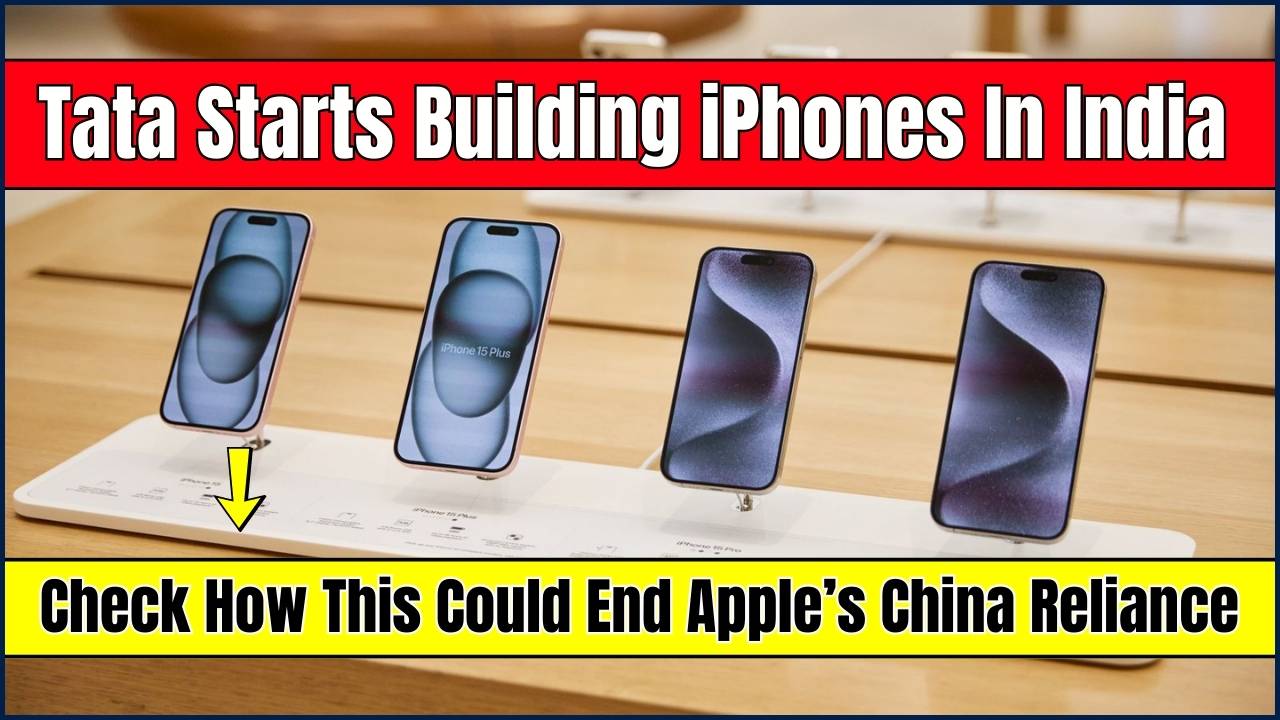Devanahalli iPhone Plant Nears Completion: Foxconn’s Devanahalli iPhone Plant is making serious waves in the global tech scene as it nears its final phase of construction. Nestled just outside Bengaluru, India, this mega factory is expected to kickstart commercial iPhone shipments by June 2025. That ain’t no small deal. With Apple aiming to diversify out of China, this move is about to change the game for both India and the global smartphone market.

The $2.6 billion facility is set to become Foxconn’s second-largest iPhone manufacturing plant on the planet. The folks in Karnataka have rolled out the red carpet, offering billions in incentives and setting the stage for India to emerge as a manufacturing powerhouse. The project also signifies the growing bond between tech giants and emerging economies, as multinational companies seek reliable and cost-effective production ecosystems.
Devanahalli iPhone Plant Nears Completion
| Point | Details |
|---|---|
| Plant Location | Devanahalli, near Bengaluru, Karnataka |
| Investment Amount | ₹21,911 crore (~$2.6 billion) |
| Launch Timeline | iPhone shipments expected by June 2025 |
| Facility Size | 300 acres in ITIR zone of Devanahalli & Doddaballapura |
| Annual Output | Up to 20 million iPhones at full capacity |
| Jobs Created | Estimated 50,000 direct and indirect jobs |
| Govt Incentives | ₹6,970 crore under ESDM policy |
| Official Source | Economic Times – Foxconn Plant Update |
Foxconn’s new iPhone plant in Devanahalli isn’t just a big deal for India—it’s a global game-changer. With a $2.6 billion tag, 20 million iPhones a year, and a June 2025 rollout, this facility could be Apple’s golden goose outside China. It brings jobs, boosts tech growth, and sets a solid example of smart manufacturing partnerships.
India’s industrial future is being rewritten—one assembly line at a time.
Why Foxconn’s India Move Is Big News
For years, Apple relied heavily on China to build its iPhones. But with ongoing trade tensions, COVID-19 aftermath, and rising labor costs, it’s been lookin’ for a new ride-or-die. Enter India.
India, with its large workforce, competitive wages, and rapidly improving infrastructure, presents a golden opportunity for tech manufacturing. This plant is part of Apple’s master plan to reduce risk and diversify its supply chain. And guess what? According to Apple CEO Tim Cook, more iPhones sold in the U.S. next quarter will be “Made in India”. That’s a whole new chapter for global electronics.
This move also underscores Apple’s commitment to becoming less China-centric, a major strategic shift after years of manufacturing dependence. With rising global instability, diversification isn’t just smart—it’s necessary.
Inside the Devanahalli Super Plant
Let’s break it down. This Foxconn plant is no backyard operation. We’re talking 300 acres of high-tech infrastructure packed into the Karnataka IT Investment Region. This massive campus will house thousands of workers and advanced assembly lines designed specifically for Apple’s product standards.
What It Will Do
- Assemble iPhones at massive scale
- Create tens of thousands of jobs
- Strengthen India’s role in the global supply chain
- Train skilled technicians and boost local innovation
Karnataka’s Industry Minister M.B. Patil called it a milestone moment. And rightly so. It’s gonna give a major boost to India’s Electronics System Design and Manufacturing (ESDM) sector. The plant will also likely act as a magnet for ancillary industries, including PCB manufacturing, logistics, and packaging firms.
What Makes Karnataka a Hot Spot for Apple
You might be wondering, Why Karnataka? Why not another state?
Here’s the lowdown:
- Proximity to Bengaluru, India’s Silicon Valley
- Strong industrial corridors and logistics
- Solid power and water supply infrastructure
- Supportive government policy & fast-track clearances
- Access to top-tier engineering talent from institutions like IISc and NITs
Foxconn got a sweet deal: ₹6,970 crore in incentives under Karnataka’s ESDM policy. And that’s not even counting the soft perks like skilled labor and ease of doing business. The region is already familiar with electronics manufacturing, giving it a head start in ecosystem development.
Timeline: From Groundbreaking to June 2025 Launch
Here’s how things have played out:
- March 2023: MoU signed between Foxconn and Karnataka govt
- April-June 2023: Land acquisition and zoning clearances
- July 2023: Construction began on a war footing
- December 2024: Internal systems and equipment installation
- May 2025: Final inspections underway
- June 2025: Expected start of commercial iPhone shipments
The project moved faster than most highway repairs in the U.S. That’s saying somethin’. Its rapid progress has been attributed to proactive state support, clearances under single-window mechanisms, and Foxconn’s aggressive deployment of resources.
India’s Rising Clout in iPhone Manufacturing
Apple’s production in India ain’t new, but this is next-level stuff. Until now, most iPhones made in India came out of Tamil Nadu plants run by Foxconn, Pegatron, and Wistron. But with the Devanahalli plant, we’re talking volume, speed, and scale.
Foxconn’s new site is expected to ship 20 million iPhones a year when it hits full steam. That makes it Apple’s second-biggest global base for iPhone assembly, right after China.
This is also a signal to the world: India is no longer just a back-office destination—it’s climbing the value chain in hardware too. The country’s inclusion in the PLI (Production-Linked Incentive) scheme has accelerated this transformation.
Local Impact: Jobs, Economy, and Beyond
This ain’t just about shiny gadgets. It’s about economic transformation:
- Direct jobs: Over 25,000 factory jobs
- Indirect jobs: 25,000+ in logistics, catering, security, etc.
- Local businesses: Boom in real estate, rentals, and retail
- Skill development: Workforce training in precision manufacturing
- Women employment: Targeting inclusive hiring policies
The region will likely see improved infrastructure, better roads, housing colonies, and services like schools and hospitals to support the new workforce. The ripple effect on nearby communities can be transformative.
Not to mention the positive buzz it creates for other tech giants. Think Samsung, Xiaomi, or even Tesla looking to hop on the India bandwagon.
Global Reactions: The China Factor
The global tech world is watching closely. With U.S.-China relations still kinda rocky, this move is a win for Apple, Foxconn, and India.
China’s loss might just be India’s gain, as more brands seek stable, democratic alternatives with lower geopolitical risks. The U.S. government has also quietly applauded Apple’s shift.
Experts believe this might pave the way for supply chain decoupling in other sectors like semiconductors, automotive, and green tech. India is positioning itself as a neutral ground in a polarized world.
What It Means for U.S. Consumers
If you’re a regular iPhone user, here’s what you might notice:
- No change in pricing (yet)
- More stable supply during holidays
- Less risk of delays from China shutdowns
- Possibly faster deliveries in North America
Bottom line? Same phone, different factory. And possibly, a more reliable one.
There’s also growing sentiment among U.S. consumers to support products not entirely made in China. The “Made in India” tag could potentially be a marketing plus in today’s geopolitical climate.
Challenges and Road Ahead
It ain’t all sunshine. India still needs to:
- Improve supply chain logistics
- Speed up port clearances
- Upgrade export infrastructure
- Ensure consistent power and water availability
- Streamline customs and compliance processes
But with the Devanahalli plant, it has sent a strong signal: India means business. The momentum is real, but sustaining it will require continuous reforms and industry-government collaboration.
FAQs About Devanahalli iPhone Plant Nears Completion
Q1. When will iPhones start shipping from the Devanahalli plant?
A. Shipments are expected to start by June 2025, following final inspections in May.
Q2. How many jobs will the plant create?
A. Estimates suggest 50,000+ direct and indirect jobs.
Q3. Why is Apple moving iPhone manufacturing to India?
A. To reduce reliance on China and diversify its global supply chain.
Q4. Will this impact iPhone prices in the U.S.?
A. Unlikely in the short term. But it may improve supply reliability.
Q5. How big is the plant?
A. The facility spans 300 acres across Devanahalli and Doddaballapura.
Q6. Will other Apple products be made there too?
A. Initially, the plant is focused on iPhones, but expansion into iPads or accessories isn’t off the table.
Q7. How does this benefit Karnataka?
A. In addition to job creation, the state sees infrastructure improvements, global visibility, and investor confidence.











